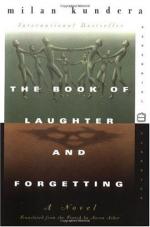|
This section contains 130 words (approx. 1 page at 400 words per page) |

|
Milan Kundera finds his literary inspiration among some of the novel's earliest practitioners, such as Francois Rabelais, Jonathan Swift, Laurence Sterne, and Denis Diderot. These early novelists, Kundera feels, were the "greatest experimenters," opening up possibilities in the novel that have since been ignored. Kundera admires these early novelists not only for their freedom of form but also for their humanism. He is especially an admirer of Diderot, who was a philosopher, encyclopedist, playwright, and critic as well as novelist. Above all, Diderot represents the Enlightenment, whose rationalist stance Kundera echoes through his irony, skepticism, and the frequent questions that appear in his work. For his humor Kundera is also indebted to the native Czech tradition, represented most notably by Jaroslav Hasek's The Good Soldier Schweik.
|
This section contains 130 words (approx. 1 page at 400 words per page) |

|




